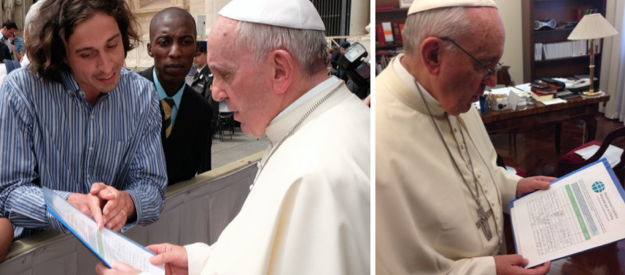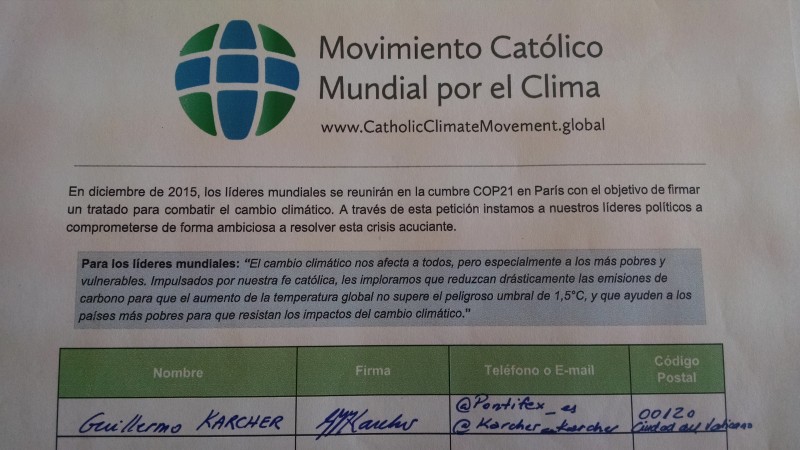"We are losing our attitude of wonder, of contemplation, of listening to creation and thus we no longer manage to interpret within it what Benedict XVI calls 'the rhythm of the love-story between God and man.'"
+ Pope Francis
The pope, a petition, and the work of the Spirit

My colleagues at the Global Catholic Climate Movement presented Pope Francis last week with our petition to world leaders. The exchange took place in St. Peter's Square after the Holy Father's May 7th Wednesday Audience. The pontiff listened intently. He joked about the group competing with his encyclical. And then he asked his Pontifical Ceremonieri, Monsignor Guillermo Karcher, to sign the petition on his behalf, in accord with papal protocol.
Later the pontiff took a paper version of the petition back to his office to review the names of some who had already signed it.
The implications of this encounter are profound. It shows what happens when Christ’s Church engages worldly ills with trust in God, prayer, fasting, and hard work. The Global Catholic Climate Movement organized worldwide days of fasting throughout Lent and in April spearheaded a prayer campaign for creation. The fruits of all this may, it seems, be seen in their meeting with and support of Pope Francis.
News of the petition's "papal blessing" was embargoed until today, the Feast of the Ascension.
Now this papal encounter has already and will continue to elevate the issue of climate change within media outlets, pulpits, parishes, classrooms, and families around the world.
And certainly the Global Catholic Climate Movement’s petition—which you too can sign here—will get the signatures and support of many. This will all highlight the momentum within the Church on environmental issues in general and climate in particular, even if it also calls attention to the sad political polarization over such issues in places like the United States.
The work of the Spirit
There is something happening here—something that people of faith shouldn’t take for granted and others may be missing completely. That something is a Someone—the Holy Spirit. It is He, after all, who animates the Church so that she may baptize the world and spread the Gospel of Life.
For Catholics all this is not surprising. It is God's way to allow the supernatural to look no different than the natural. To better appreciate what that means, it’s helpful to take a quick look at Christian revelation and the sacramental faith of the Church
From what is revealed to us in scripture, we know that God created the world and humanity to live within it and tend it; but human free will chooses to fulfill its own desire rather than follow God’s laws. God allows the consequences of those choices; but He offers to help make things right and repair our relationship with Him. This doesn’t happen easily, since humanity keeps choosing desire over God’s ways. God and humanity have a sometimes tense back and forth.
And so God the Father fulfills His promise of salvation—of making all things right and new—by entering human history in a definitive way: His word becomes flesh and dwells among us in a specific time and place within human history. He teaches us. He heals. And He sacrifices for us by entering the most terrible consequences of human choices—death itself. And yet, it is in entering death that He brings new life. And this new life reverberates throughout all creation even if, as we celebrate today on the Feast of the Ascension, Christ returns to the Father. Because to help us in the here and now, His Spirit continues to be God With Us. The Spirit elevates the Church so that the Church can bring life to and elevate the world. And so creation continues.
Now for the sacraments: Here I’d point to the second chapter of the Gospel of John. When Christ turns water into wine, there isn’t much of a fuss. No blinding light. No earthquake. Nothing that would indicate the big things that were happening quietly inside those humdrum stone jars. But in silence and among the ordinary events of human life, the Son of God changed water into wine. And in the Seven Sacraments He quietly elevates all nature—human nature especially—with His grace and the use of the ordinary: bread, wine, oil, water, conversations, and people’s lives.
And so it went last week in St. Peter’s Square when a group of Catholics concerned about climate change met with Pope Francis to present their petition to the world. In an ordinary encounter among people, using ordinary words, pens, and paper, the Church continued in dramatic fashion its desire to protect people and creation.

As a founding member of the Global Catholic Climate Movement I am a little stunned—although I shouldn’t be—with how our ordinary efforts have now taken extraordinary flight. Weekly Skype calls took place with co-founders—especially our hardworking, loyal, and meticulous visionary and facilitator, Tomás Insua. We called from Argentina, the Philippines, Kenya, the United States, Hong Kong, the United Kingdom, and elsewhere. We forged lasting friendships and shared labors and knowledge to help the Church galvanize support for historic changes in how humanity goes about its industry. And we are, of course, building on and seeking to help the work of so many others, especially the miracle workers on the front lines of the Church's charitable efforts.
The implications
And this work of the Church—of the Spirit—is so very vital. Which is why the signals offered by Pope Francis are, well, nothing short of a sign of the Church doing what she does: Changing human history for the better with the extraordinary grace of God working through the ordinary lives of you and me.
“The support of Pope Francis [on this issue] is very important as climate change is a great and urgent moral issue,” said my friend Allen Ottaro, director of Catholic Youth Network for Environmental Sustainability in Africa, which is based in Kenya. Allen is also a co-founder of GCCM. “Climate change hits the poorest first and hardest, and will leave an unnecessarily dire legacy for future generations. We Catholics need to step up against climate change and raise a strong voice asking political leaders to take action urgently. I encourage all to sign the petition our website.”
News of the pope and a petition will indeed inspire many Catholics to sign that petition and take climate change seriously. Throughout the world that will translate into action within local and national governments, and that will change policies as the Church goes about elevating human hearts, saving souls, and insisting that we all take seriously the great tasks given to us to steward creation and, yes, to baptize all nations in the name of the Father, and the Son, and the Holy Spirit.
Photos by GCCM, an international network of over 100 Catholic organizations, working to rally Catholics worldwide to take action on climate change as the Pope prepares to publish his highly anticipated encyclical on ecology this coming June. Top photo (credit Credit: Fotografia Felici) left: Pope Francis receives a copy of the GCCM petition from Tomás Inusa (Argentina) while Allen Ottaro (Kenya) watches. Top right: Pope Francis reads the petition in the papal offices.


















